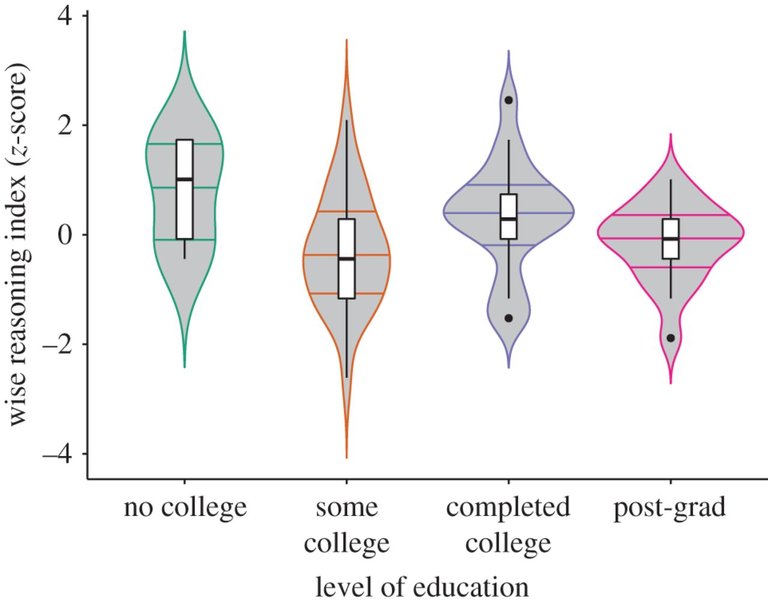https://www.sciencemag.org/news/2017/12/lower-your-social-class-wiser-you-are-suggests-new-study (<-- from this blogpost)
Excerpt from post:
They then answered 20 questions applicable to that or any conflict, including: "Did you ever consider a third-party perspective?" "How much did you try to understand the other person's viewpoint?" and "Did you consider that you might be wrong?" Grossmann and Brienza crunched the data and assigned the participants both a "Wise reasoning" score based on the conflict answers and a "Social class" score, then plotted the two scores against one another.
As with the first part of the experiment, those in lower social classes consistently had higher wise-reasoning scores than those in higher social classes, the researchers reported today in the Proceedings of the Royal Society B. IQ scores weren't associated one way or another with wise reasoning.
The findings make sense, Jayawickreme says, as people who grow up in a working-class environment have to rely on shared, communal resources more than people in the middle class, and therefore hone social techniques that smooth out conflicts with their peers.
If you want to foster wise reasoning in yourself, Grossmann advises, try to use third-person language when thinking about conflicts.
Eventually, Grossman wants to expand his study of wisdom to people at the extremes of social class.
When reading the study(http://rspb.royalsocietypublishing.org/content/284/1869/20171870) it looks like a weak study to me.
First author appears to be a grad student (or recently earned his degree), but the second author is a highly-cited professor, so I don't think the issue is unfamiliarity with methodology and study design.
They're trying to measure "wise reasoning," which they say is the ability to navigate social conflict, and they measured it with questions like, "Did you consider that you might be wrong?" and "Did you imagine things from the other person's perspective?"
First, they did it at the state level, and found an inverse correlation between "wise reasoning" and the "status of the state". Here's their plot and trendline: 
Then, because the state-level results showed a correlation, they grabbed an online convenience sample (recruited in 2007-2009, from Washentaw County, Michigan) of individuals and coded results on a 1-3 scale, and concluded that education is negatively correlated with "wise reasoning."

Why does something like this get published? It almost looks like complete nonsense and pseudoscience...